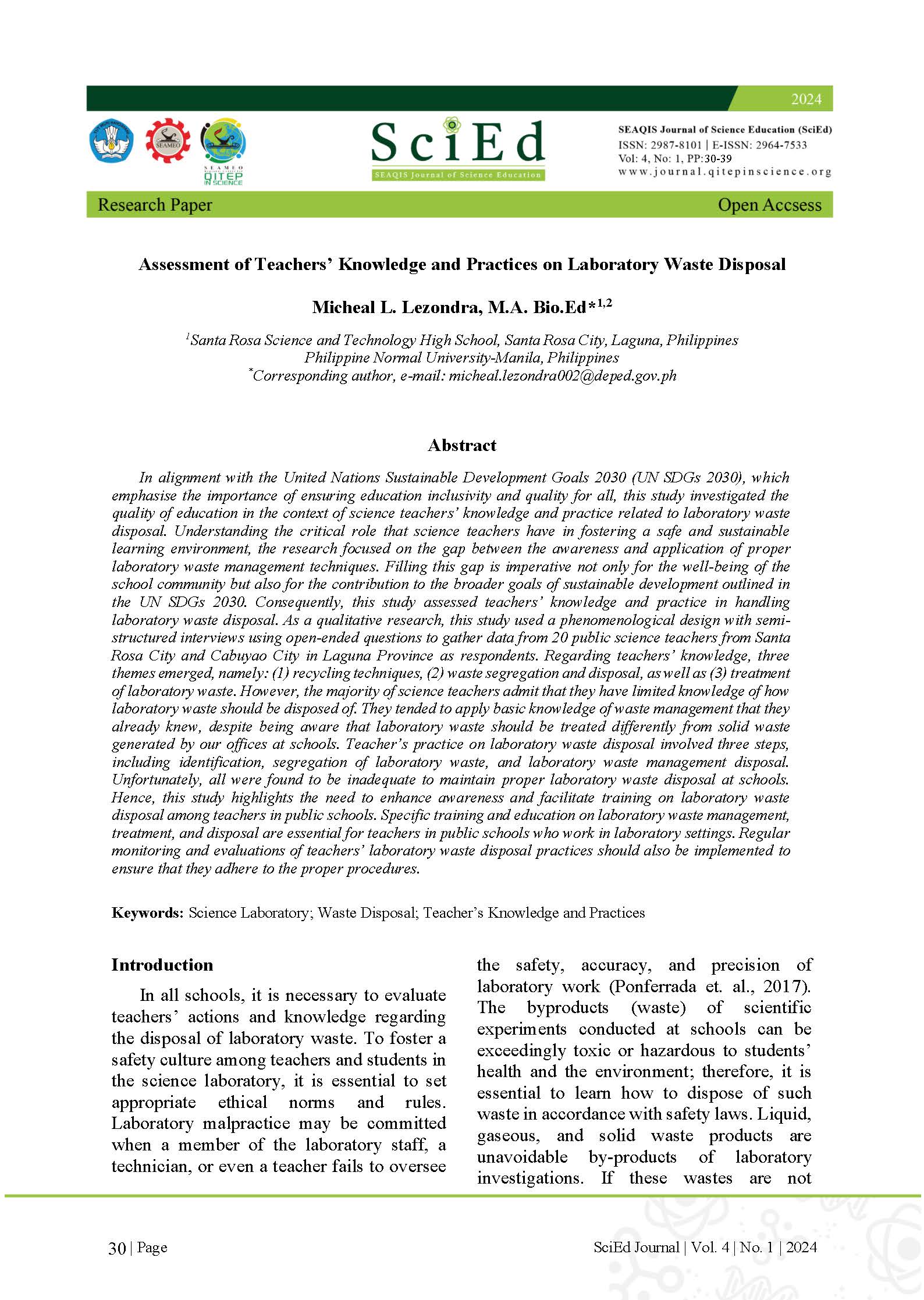Assessment of Teachers’ Knowledge and Practices on Laboratory Waste Disposal
DOI:
https://doi.org/10.58249/sjse.v4i1.131Abstract
In alignment with the United Nations Sustainable Development Goals 2030 (UN SDGs 2030), which emphasise the importance of ensuring education inclusivity and quality for all, this study investigated the quality of education in the context of science teachers’ knowledge and practice related to laboratory waste disposal. Understanding the critical role that science teachers have in fostering a safe and sustainable learning environment, the research focused on the gap between the awareness and application of proper laboratory waste management techniques. Filling this gap is imperative not only for the well-being of the school community but also for the contribution to the broader goals of sustainable development outlined in the UN SDGs 2030. Consequently, this study assessed teachers’ knowledge and practice in handling laboratory waste disposal. As a qualitative research, this study used a phenomenological design with semi-structured interviews using open-ended questions to gather data from 20 public science teachers from Santa Rosa City and Cabuyao City in Laguna Province as respondents. Regarding teachers’ knowledge, three themes emerged, namely: (1) recycling techniques, (2) waste segregation and disposal, as well as (3) treatment of laboratory waste. However, the majority of science teachers admit that they have limited knowledge of how laboratory waste should be disposed of. They tended to apply basic knowledge of waste management that they already knew, despite being aware that laboratory waste should be treated differently from solid waste generated by our offices at schools. Teacher’s practice on laboratory waste disposal involved three steps, including identification, segregation of laboratory waste, and laboratory waste management disposal. Unfortunately, all were found to be inadequate to maintain proper laboratory waste disposal at schools. Hence, this study highlights the need to enhance awareness and facilitate training on laboratory waste disposal among teachers in public schools. Specific training and education on laboratory waste management, treatment, and disposal are essential for teachers in public schools who work in laboratory settings. Regular monitoring and evaluations of teachers’ laboratory waste disposal practices should also be implemented to ensure that they adhere to the proper procedures
References
Abne, K., Anasco, J., Dagpin, J., Igcalinos, J., Lucagbo, M., Mandamiento, R., Quilang, M., & Galarpe, V. R. K. (2017). Awareness, Perception and Practices (App) of Undergraduate Students Towards Solid Waste Management (SWM). Journal of Biodiversity and Environmental Sciences, 11. 159-168.
Ancheta, A. C. (2017). Electronic Waste Management Practices and Its Extent of Implementation: A Case of an Academic Institution. Southern Leyte State University, Sogod, Southern Leyte, Philippines. Journal of Educational and Human Resource Development, 57, 51–57.
Braun, V. & Clarke, V. (2006). Using Thematic Analysis in Psychology. Qualitative Research in Psychology, 3(2), 77-101.
Chen, Y. & Wang, Z. (2016). Analysis of Laboratory Waste Management Practices in China. Journal of Hazardous Materials, 305, 53-60. doi: 10.1016/j.jhazmat.2015.10.033
Commission on Higher Education. (2017). Policies, Standards, and Guidelines for Bachelor of Secondary Education (BSEd). url: https://ched.gov.ph/wp-content/uploads/2017/11/CMO-No.-75-s.-2017.pdf
Commission on Higher Education. (2004). Policies, Standards, and Guidelines for Bachelor of Secondary Education (BSEd). Revised Policies and Standards for Undergraduate Teacher Education Curriculum. url: https://ched.gov.ph/wp-content/uploads/2017/10/CMO-No.30-s2004.pdf
Ioan, C., Onose, D. A., & Raluca, S. (2012). Waste Management in Public Educational Institutions of Bucharest City, Romania. Procedia Environmental Sciences, 14, 71–78.
Khan, M. A. & Raza, S. (2018). Management of School Science Laboratories: An Overview of Problems and Solutions. Journal of Education and Practice, 9(2), 114-121.
Kostov, P. & Kostova, P. (2020). Laboratory Safety and Risk Management in Science Education. Journal of Science Education and Technology, 29(6), 715-727. doi: 10.1007/s10956-020-09819-5
Lee, J. Y., Kim, Y. K., & Kim, J. H. (2021). Laboratory Safety Education for High School Students: A Review of Current Practices and Future Directions. Journal of Science Education and Technology, 30(2), 153-168. doi: 10.1007/s10956-021-09890-9
Licy, C.D., Vivek, R., Saritha, K., Anies, T.K., & Josphina, C.T. (2013) Awareness, Attitude and Practice of School Students towards Household Waste Management. Journal of Environment, 2, 147-150 https://www.researchgate.net/profile/Vivek_Raghavan2/publication/269520226_Awareess_Attitude_and_Practice_of_School_Students_towards_Household_Waste_Management/links/548e6d9e0cf2d1800d8424ba.pdf
Miles, M.B. & Huberman, A.M. (1994). Qualitative Data Analysis: An Expanded Sourcebook (2nd Ed.). Sage Publications.
Moustakas, C. (1994). Phenomenological Research Methods. Sage.
O’Neil, J. (2019). Environmental Education in the Primary Classroom: Current Practices and Future Directions. Journal of
Environmental Education, 50(1), 1-14. doi: 10.1080/00958964.2018.1540204
Paghasian, M. C. (2017). Awareness and Practices on Solid Waste Management among College Students in Mindanao State University Maigo School of Arts and Trades. Advances in Social Science, Education and Humanities Research, 128, 5–12.
Patel, R. & Patel, J. (2017). A Study of Laboratory Waste Management Practices in Universities. Journal of Environmental Management, 198, 1-7. doi: 10.1016/j.jenvman.2017.03.051
Perez, M. S. (2014). Waste Management Practices of Science Laboratories among Higher Education Institutions in Davao City: Basis for a City-Wide Waste Management Enhancement Program in Science Laboratories. International Journal of Sciences: Basic and Applied Research, 10, 2307-4531.
Ponferrada, C. O., Cabigon, E. J. L., & Daque, J. G. (2017). Laboratory Safety Awareness Among General Physics Undergraduate Students. Engineering, Technology, & Applied Science Research, 7(6), 2324-2327.
Sandham, P. L. A. (2014). Waste Management Behavior: A Case Study of School Children in Mapumalanga, South Africa Im Van Niekerk Supervisor: Assistant Supervisor. Mini dissertation submitted in partial fulfillment of the requirements for the degree Magister in Environmental Management at the Potchefstroom Campus of the North-West University.
Saldaña, J. (2016). The Coding Manual for Qualitative Researchers. Sage.
Smith, J. (2019). Safe Laboratory Waste Management Practices in High Schools. Journal of Chemical Health and Safety, 26(6), 27-33. doi: 10.1016/j.jchas.2019.06.003
Starovoytova, D. (2018). Solid Waste Management (SWM) at a University Campus (Part 1/10): Comprehensive Review on Legal Framework and Background to Waste Management, at a Global Context. Journal of Environment and Earth Science, 8(4), 2225-0948.
Tan, J. H. & Tan, S. (2019). Classroom Management Practices of Primary School Teachers in Singapore. Asia Pacific Journal of Education, 39(4), 473-486. doi: 10.1080/02188791.2019.1668897

Downloads
Published
Issue
Section
Citation Check
License
Copyright (c) 2024 SEAQIS Journal of Science Education

This work is licensed under a Creative Commons Attribution 4.0 International License.

This work is licensed under a Creative Commons Attribution 4.0 International License.














